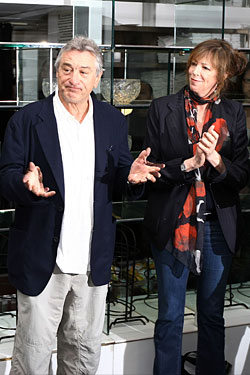
The Tribeca Film Festival has undergone many changes in its eight years — understandably, given that the event started off as a response to 9/11 and has since developed into one of the more high-profile film festivals in the U.S. Earlier this week, we asked Tribeca co-founders Robert De Niro and Jane Rosenthal to discuss their hopes for this year’s event, which runs from April 21 to May 2. “We put together the first festival in 120 days,” says Rosenthal. “The fact that we screened so many movies was a feat in itself. But like a child, by the time you’re eight, you have more of a personality, you’re able to run and walk and talk. But,” she adds, “you have to keep developing.”
The twist, of course, is that the child is developing under the skeptical eyes of the media. “It’s easy to criticize,” says De Niro. “We’re doing our best. We have to make ultimate decisions.” He notes that there will probably always be critics of the festival. “It’s not perfect, and some people will never agree with certain things. But people will always criticize the president, too, whether it’s for doing something or not doing something. In the end, you still have to go and make decisions.”
In previous years, most of Tribeca’s development — and much of the criticism — centered around its slate, with the sheer volume of films (most of them unknown quantities) oftentimes proving overwhelming for viewers. (The 2006 festival featured an eye-popping 169 features, 90 of them world premieres.) In recent years, however, the lineup has shrunk to a more reasonable number. This year’s fest has 85 features, about the same number as last year. And like previous years, the festival has a solid lineup of nonfiction movies. De Niro says he’s been watching a number of the documentaries, and says he’s impressed in particular with Alex Gibney’s My Trip to Al Qaeda (Gibney’s Oscar-winning doc Taxi to the Dark Side premiered at the 2007 festival), Ricki Stern and Anne Sundberg’s Joan Rivers: A Piece of Work, and Monica and David, directed by Alexandra Codina, an alumnus of Tribeca All Access, a program that provides contacts, resources, and other support for new filmmakers.
Major changes are still afoot, however, including Tribeca Film Festival Virtual, which will offer online users the ability to see eight of this year’s features and eighteen of the shorts online, as well as participate in filmmaker Q&As. There’s also Tribeca Film, a new distribution plan which will offer a “robust lineup” of films from the festival through video on demand (via participating cable providers). Of course, many festivals are experimenting this way — earlier this year, Sundance offered up a few of its features via YouTube, an experiment that was generally regarded as a disaster. One could argue that Tribeca, as a young festival, is better positioned to take advantage of these transformations, the same way that kids adapt to new technologies better then their parents. Maybe that’s why, as Rosenthal notes proudly, Tribeca’s is currently the most ambitious of these initiatives.





